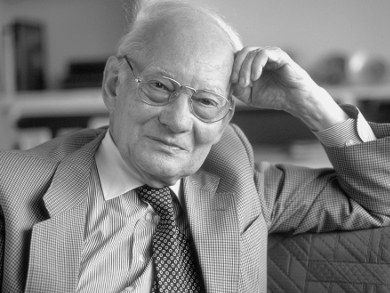Manfred Eigen, Nobel Laureate in Chemistry and Founder of the Max Planck Institute (MPI) for Biophysical Chemistry in Göttingen, Germany, has passed away on February 6, 2019.
Eigen pioneered the so-called relaxation methods, which make it possible to determine reaction rates in the micro- and nanosecond range. These methods involve rapidly disturbing a reacting system and observing it while it returns to equilibrium. Based on this achievement, he received the Nobel Prize in Chemistry 1967 together with Ronald G. W. Norrish and George Porter “for their studies of extremely fast chemical reactions, effected by disturbing the equilibrium by means of very short pulses of energy”.
Later in his career, Eigen focused on evolutionary biotechnology. He worked on the self-organization of complex molecules and developed evolutionary machines, which imitate the process of evolution in the chemical laboratory.
Manfred Eigen was born in Bochum, Germany, in 1927. He studied physics and chemistry at the University of Göttingen, Germany, where he received his Ph.D. in 1951. In 1953, he joined the Max Planck Institute for Physical Chemistry, Göttingen. From 1971 until his retirement in 1995, he was Head of the Department of Biochemical Kinetics at the Max Planck Institute for Biophysical Chemistry, which had been founded on his initiative. Eigen also co-founded two biotechnology companies, Evotec AG, Hamburg, Germany, and DIREVO Biosystems AG, Cologne, Germany.
Besides the Nobel Prize and among many other honors, Eigen received the Otto-Hahn-Prize for Chemistry and Physics in 1962, the Helmholtz Medal from the Berlin-Brandenburg Academy of Sciences and Humanities in 1994, and the Wilhelm Exner Medal from the Austrian Industry Association in 2011, as well as several honorary doctorates.
Selected Publications
- Methods for investigation of ionic reactions in aqueous solutions with half-times as short as 10–9 sec. Application to neutralization and hydrolysis reactions,
M. Eigen,
Discuss. Faraday Soc. 1954, 17, 194–205.
DOI: 10.1039/df9541700194 - Über die Kinetik sehr schnell verlaufender Ionenreaktionen in wässeriger Lösung (in German),
M. Eigen,
Z. Phys. Chem. 1954, 1, 176–200.
DOI: 10.1524/zpch.1954.1.3_4.176 - Schallabsorption in Elektrolytlösungen als Folge chemischer Relaxation II. Meßergebnisse und Relaxationsmechanismen für 2—2-wertige Elektrolyte (in German),
M. Eigen, K. Tamm,
Ber. Bunsen-Ges. 1962, 66, 107–121.
DOI: 10.1002/bbpc.19620660206 - The Kinetics of Halogen Hydrolysis,
M. Eigen, K. Kustin,
J. Am. Chem. Soc. 1962, 84, 1355–1361.
DOI: 10.1021/ja00867a005 - Elementary Steps in Enzyme Reactions (as Studied by Relaxation Spectrometry),
M. Eigen, G. Hammes,
Adv. Enzymol. Relat. Areas Mol. Biol., 1963, 25, 1–38.
DOI: 10.1002/9780470122709 - Proton Transfer, Acid-Base Catalysis, and Enzymatic Hydrolysis. Part I: Elementary Processes,
M. Eigen,
Angew. Chem. Int. Ed. Engl. 1964, 3, 1–19.
DOI: 10.1002/anie.196400011 - Molecular Quasi-Species,
M. Eigen, J. McCaskill, P. Schuster,
J. Phys. Chem. 1988, 92, 6881–6891.
DOI: 10.1021/j100335a010 - Sorting single molecules: application to diagnostics and evolutionary biotechnology.,
M. Eigen, R. Rigler,
Proc. Natl. Acad. Sci. USA 1994, 91, 5740–5747.
https://doi.org/10.1073/pnas.91.13.5740

